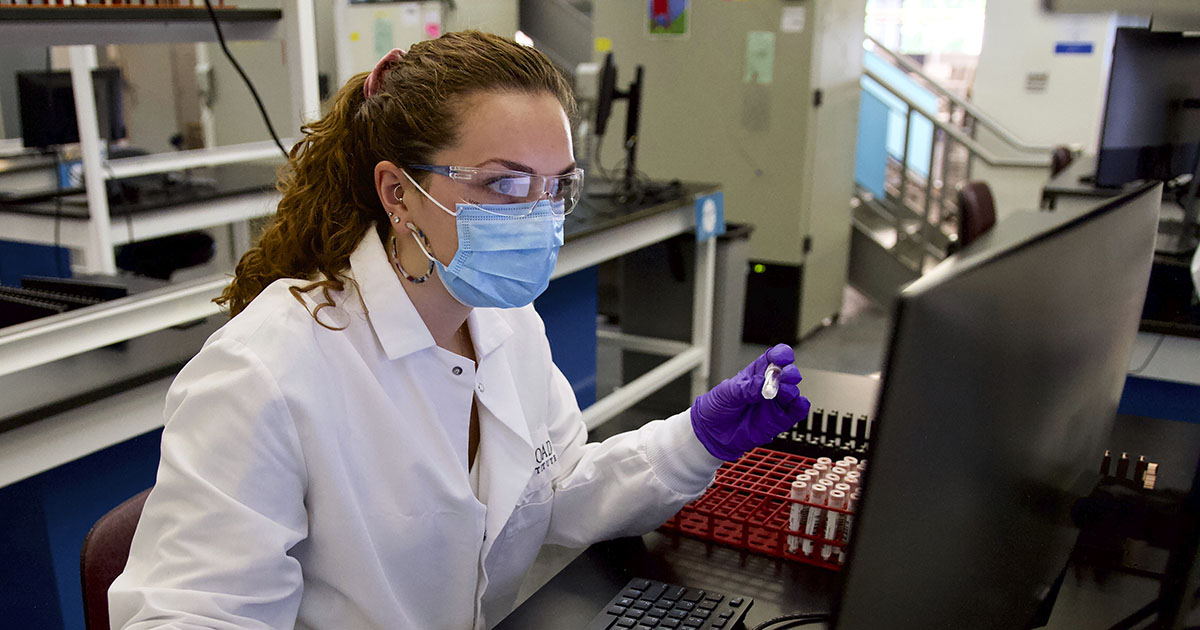Here’s How Babson Will Test Students, Faculty, and Staff for COVID-19 This Fall

As students, faculty, and staff diligently prepare for a return to Babson College’s campuses this fall, a critical component of working to safeguard everyone is a plan to test the community for COVID-19.
To facilitate testing on the Wellesley campus, Babson has engaged the Broad Institute of MIT and Harvard. Known for cutting-edge biomedical research, the Broad Institute converted part of its clinically certified lab into a high-throughput COVID-19 testing facility. The team has steadily increased the pace and scale of diagnostic testing, and recently expanded its daily capacity to 35,000 tests with a 24-hour-or-less turnaround time upon receipt.
“Our partnership with the Broad, a world-renowned institution with strong local connections, will enable us to provide rapid and reliable testing for our campus community,” said Babson Chief Operating Officer Kelly Lynch. “By regularly testing asymptomatic students, faculty, and staff, Babson is going above and beyond current public health requirements as part of a comprehensive strategy designed to bring our campus community together this fall and do so as safely as possible.”
Rapid COVID-19 Surveillance Testing at Babson
The Centers for Disease Control and Prevention (CDC) and Massachusetts reopening guidelines call for testing of symptomatic students. Students who are symptomatic will be tested through Babson’s Health Services office, with testing costs billed to the student’s insurance.
Babson’s comprehensive testing plan goes beyond state requirements, instituting asymptomatic surveillance testing of all students, faculty, and staff planning to return to the College’s campuses in Wellesley, Boston, and Miami.
All students and employees returning to campus will be tested–the vast majority within 24 hours. Testing for community members based in Wellesley or Boston will take place on the first level of the BECC parking garage, a space chosen specifically because it is large, outdoors and covered. Planning is underway for testing procedures at the Miami campus, in collaboration with building management. Students and employees will receive their results within 24-48 hours.
Babson’s asymptomatic tests will be conducted at no cost to students, faculty, or staff—the College is investing its resources to implement this health measure.
Asymptomatic Testing at Babson’s Wellesley Campus
Through the partnership with the Broad Institute, the Wellesley campus will use nucleic acid amplification tests, or molecular tests. The test detects active COVID-19 infection.
Participants will swab their nostrils themselves, under the direction of a health professional, using an anterior nasal swab. The anterior method is a more comfortable alternative to the nasopharyngeal swab, which involves inserting an elongated swab deep into the nose to the upper part of the throat.
Use of the molecular RNA test enables rapid detection of infection, even in asymptomatic community members. Those who test positive, or come into contact with someone who tests positive, will isolate to reduce the risk of spread.
“Every aspect of our testing plan is designed to safeguard our community,” said Ryan Travia, associate dean of wellness. “We have carefully considered the logistics of testing, which will be conducted at our largest, covered, outdoor site, and have developed procedures and staffing plans that will ensure a safe, efficient process for our community.”
Planning is underway for weekly testing throughout the fall semester, though the frequency could be adjusted up or down based on public health guidance and community needs, said Lynch.
Posted in Community



